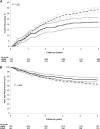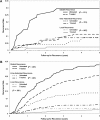DNA mismatch repair status and colon cancer recurrence and survival in clinical trials of 5-fluorouracil-based adjuvant therapy
- PMID: 21597022
- PMCID: PMC3110173
- DOI: 10.1093/jnci/djr153
DNA mismatch repair status and colon cancer recurrence and survival in clinical trials of 5-fluorouracil-based adjuvant therapy
Erratum in
- J Natl Cancer Inst. 2011 Nov 2;103(21):1639. Kim, George P [added]
Abstract
Background: Approximately 15% of colorectal cancers develop because of defective function of the DNA mismatch repair (MMR) system. We determined the association of MMR status with colon cancer recurrence and examined the impact of 5-fluorouracil (FU)-based adjuvant therapy on recurrence variables.
Methods: We included stage II and III colon carcinoma patients (n = 2141) who were treated in randomized trials of 5-FU-based adjuvant therapy. Tumors were analyzed for microsatellite instability by polymerase chain reaction and/or for MMR protein expression by immunohistochemistry to determine deficient MMR (dMMR) or proficient MMR (pMMR) status. Associations of MMR status and/or 5-FU-based treatment with clinicopathologic and recurrence covariates were determined using χ(2) or Fisher Exact or Wilcoxon rank-sum tests. Time to recurrence (TTR), disease-free survival (DFS), and overall survival (OS) were analyzed using univariate and multivariable Cox models, with the latter adjusted for covariates. Tumors showing dMMR were categorized by presumed germline vs sporadic origin and were assessed for their prognostic and predictive impact. All statistical tests were two-sided.
Results: In this study population, dMMR was detected in 344 of 2141 (16.1%) tumors. Compared with pMMR tumors, dMMR was associated with reduced 5-year recurrence rates (33% vs 22%; P < .001), delayed TTR (P < .001), and fewer distant recurrences (22% vs 12%; P < .001). In multivariable models, dMMR was independently associated with delayed TTR (hazard ratio = 0.72, 95% confidence interval = 0.56 to 0.91, P = .005) and improved DFS (P = .035) and OS (P = .031). In stage III cancers, 5-FU-based treatment vs surgery alone or no 5-FU was associated with reduced distant recurrence for dMMR tumors (11% vs 29%; P = .011) and reduced recurrence to all sites for pMMR tumors (P < .001). The dMMR tumors with suspected germline mutations were associated with improved DFS after 5-FU-based treatment compared with sporadic tumors where no benefit was observed (P = .006).
Conclusions: Patients with dMMR colon cancers have reduced rates of tumor recurrence, delayed TTR, and improved survival rates, compared with pMMR colon cancers. Distant recurrences were reduced by 5-FU-based adjuvant treatment in dMMR stage III tumors, and a subset analysis suggested that any treatment benefit was restricted to suspected germline vs sporadic tumors.
Figures



Comment in
-
Microsatellite instability, prognosis and drug sensitivity of stage II and III colorectal cancer: more complexity to the puzzle.J Natl Cancer Inst. 2011 Jun 8;103(11):841-4. doi: 10.1093/jnci/djr170. Epub 2011 May 19. J Natl Cancer Inst. 2011. PMID: 21597023 No abstract available.
-
[Microsatellite instability in colon cancer: important to decide over adjuvant treatment?].Z Gastroenterol. 2011 Jul;49(12):1558-60. doi: 10.1055/s-0031-1281777. Epub 2011 Dec 2. Z Gastroenterol. 2011. PMID: 22139881 German. No abstract available.
References
-
- Jemal A, Siegel R, Ward E, et al. Cancer statistics, 2009. CA Cancer J Clin. 2009;59(4):225–249. - PubMed
-
- Ionov Y, Peinado MA, Malkhosyan S, et al. Ubiquitous somatic mutations in simple repeated sequences reveal a new mechanism for colonic carcinogenesis. Nature. 1993;363(6429):558–561. - PubMed
-
- Peltomaki P. Role of DNA mismatch repair defects in the pathogenesis of human cancer. J Clin Oncol. 2003;21(6):1174–1179. - PubMed
-
- Thibodeau SN, Bren G, Schaid D. Microsatellite instability in cancer of the proximal colon. Science. 1993;260(5109):816–819. - PubMed
Publication types
MeSH terms
Substances
Grants and funding
LinkOut - more resources
Full Text Sources
Other Literature Sources
Research Materials
Miscellaneous

